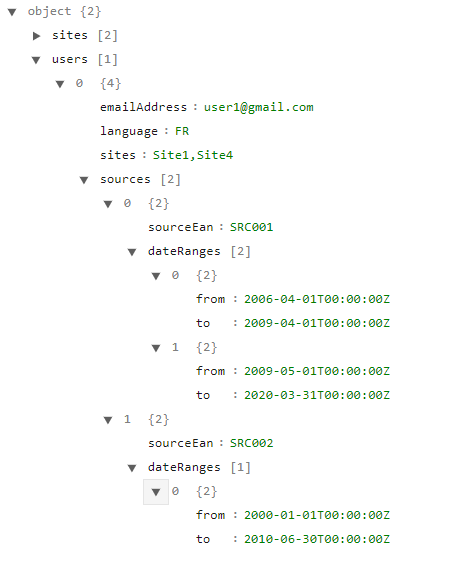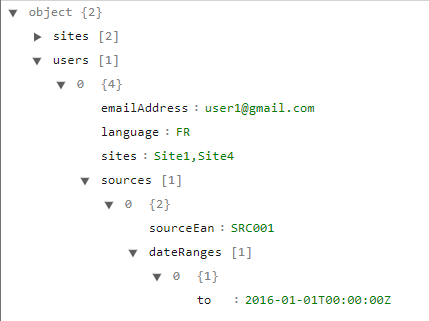JSON item
A JSON item is a complex object used to describe a site, source, event or user
{ "Item" : {
"OpIdentifier" : "[Mandatory] A master data identifier",
"Path" : "[Optional] The relative path of the element in the Master Data Upload file",
"Tranform" : "[Optional] A tranformation to apply to the original value",
"Validity" : "[Optional] The relative path of the validity element in the Master Data Upload file"
}
}
OpIdentifier
The identifier must be ''opSite'', ''opSource'', ''opEvent'' or ''opUser'' followed by a site, source, event, user property or ''opSiteForm'', ''opSourceForm'', ''opEventForm'' followed by a form expression. There must also be one and only one identifier ''opKey'' that indicates the business key path of the entity.
Path
The relative JSON path of the value to store in the OpIdentifier property. The path is not used when Transform operation is set to Force, Query or List
Tranform
A complex object that defines a forced value or a append to apply to the original value prior to set the destination property.
Validity
The Validity is a JSON path relative to the Path indicating the element that contains a list of validity periods for a site/source
{
"OpUser": {
"RootPath": "users[*]",
"Items": [
{
"opIdentifier": "opUser.Sites",
"path": "sites[*].siteKey",
"validity": "dateRanges"
},
{
"opIdentifier": "opUser.Sources",
"path": "sources[*].sourceEan",
"validity": "dateRanges"
}
]
}
}
Warning
The Validity property is only meaningful in the elements that set the sources (''opUser.Sources'') a user has access to
Validity periods
The purpose of the validity is to allow to define periods during which a user can access data points. You should see these periods as restriction periods: if no period is specified, to user has access to all source data points. If at least one period is specified, the user has access to data points inside the specified periods.
Important
Dates must be expressed in UTC ISO 8601 format
Every period provided by a JSON Master Data Upload File is merged with the existing once, meaning that you can just extend the resulting period. Periods may overlap, a merge operation is performed once processed.

This JSON Master Data Upload File allows user ***user1@gmail.com*** to access the data points of the source SRC001 from 2006-04-01T00:00:00Z included and 2009-04-01T00:00:00Z
excluded and also from 2009-05-01T00:00:00Z to 2020-03-31T00:00:00Z. This user also has access to the data points of source SRC002 from 2000-01-01T00:00:00Z to 2010-06-30T00:00:00Z
Validity end
When a JSON Master Data Upload File contains a period that only mentions an end date, it indicates that this date is the end date for this user/source. Based on this information the MDE will ensure that none of the period end dates will exist beyond this date.

Once processed, the user may access data points of the source SRC001 from 2006-04-01T00:00:00Z and 2009-04-01T00:00:00Z (unchanged) and from 2009-05-01T00:00:00Z to 2016-01-01T00:00:00Z (modified end date).
